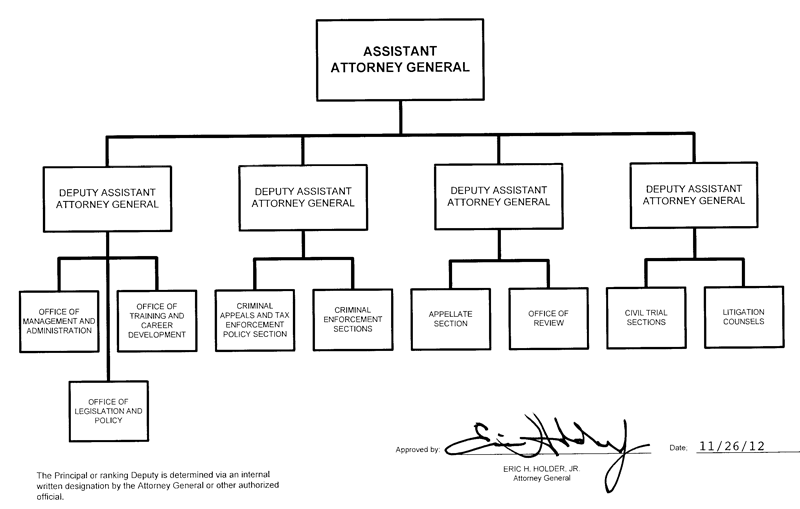Tax Division

Tax Division Organizational Chart
- Assistant Attorney General
- Deputy Assistant Attorney General
- Office of Management and Administration
- Office of Training and Career Development
- Office of Legislation and Policy
- Deputy Assistant Attorney General
- Criminal Enforcement Sections
- Criminal Appeals & Tax Enforcement Policy Section
- Deputy Assistant Attorney General
- Office of Review
- Appellate Section
- Deputy Assistant Attorney General
- Civil Trial Sections
- Litigation Counsels
- Deputy Assistant Attorney General
Footnote: The Principal or ranking Deputy is determined via an internal written designation by the Attorney General or other authorized official.
Approved by Eric H. Holder Jr., Attorney General
November 26, 2012
History
The Tax Division was established on January 1, 1934, under Attorney General Homer Cummings pursuant to Executive Order 6166 issued by President Franklin D. Roosevelt.
Mission
The Tax Division is generally responsible for conducting, handling or supervising all civil and criminal matters arising under the internal revenue laws. The Tax Division’s mission is to enforce the nation’s tax laws fully, fairly and consistently, through both criminal and civil litigation, in order to promote voluntary compliance with the tax laws, maintain public confidence in the integrity of the tax system, and promote the sound development of law. The Division's authority is codified at 28 C.F.R. §§ 0.70 and 0.71.
Major Functions
The major functions of the Division are to:
- Prosecute and defend in all state and federal courts, except the United States Tax Court, civil suits arising under the internal revenue laws. These matters include tax refund suits brought against the United States, bankruptcy cases involving federal tax claims, judicial actions to enforce administrative summonses, affirmative actions to collect unpaid taxes, Freedom of Information Act (FOIA) suits involving the Internal Revenue Service (IRS), certain regulations on Administrative Procedures Act challenges, and tort and damages actions against the United States and/or IRS and Justice Department officials.
- Oversee all federal criminal tax enforcement and direct the investigation and/or prosecution of selected criminal tax cases. Enforce federal criminal tax law and related criminal laws by reviewing referrals from the IRS or requests to include potential criminal tax charges in existing investigations, authorizing investigation and/or prosecution where appropriate, and conducting or supervising authorized investigations or prosecutions. Such matters include allegations against individuals and corporations who attempt to evade taxes, willfully fail to file tax returns, submit false tax forms, and otherwise try to defraud the Federal Treasury, not infrequently focusing on violations involving international activity, such as the use of offshore trusts and foreign bank accounts to evade taxes. These matters may also address tax violations that occur in the course of other criminal conduct - such as crime linked to international terrorism, illegal drug trafficking, securities fraud, bankruptcy fraud, health care fraud, organized crime, and public corruption.
- Represent the United States in the courts of appeals in nearly all federal civil tax cases, including those appealed from the United States Tax Court, and in all federal criminal tax cases prosecuted by Tax Division attorneys. Division attorneys also supervise appeals in criminal tax cases tried by U.S. Attorneys’ Offices around the country.
- Advise the IRS and the Department of the Treasury concerning proposed legislation, regulations, guidance, procedures, and policy relating to internal revenue laws and tax enforcement. Division attorneys also participate in the negotiation of international tax assistance treaties and agreements.
- Represent the United States in matters involving the Federal Government’s immunity from state or local taxation (except actions to set aside ad valorem taxes, assessments, special assessments, and tax sales of federal real property, and matters involving payments in lieu of taxes), as well as state or local taxation involving contractors performing contracts for or on behalf of the United States.

